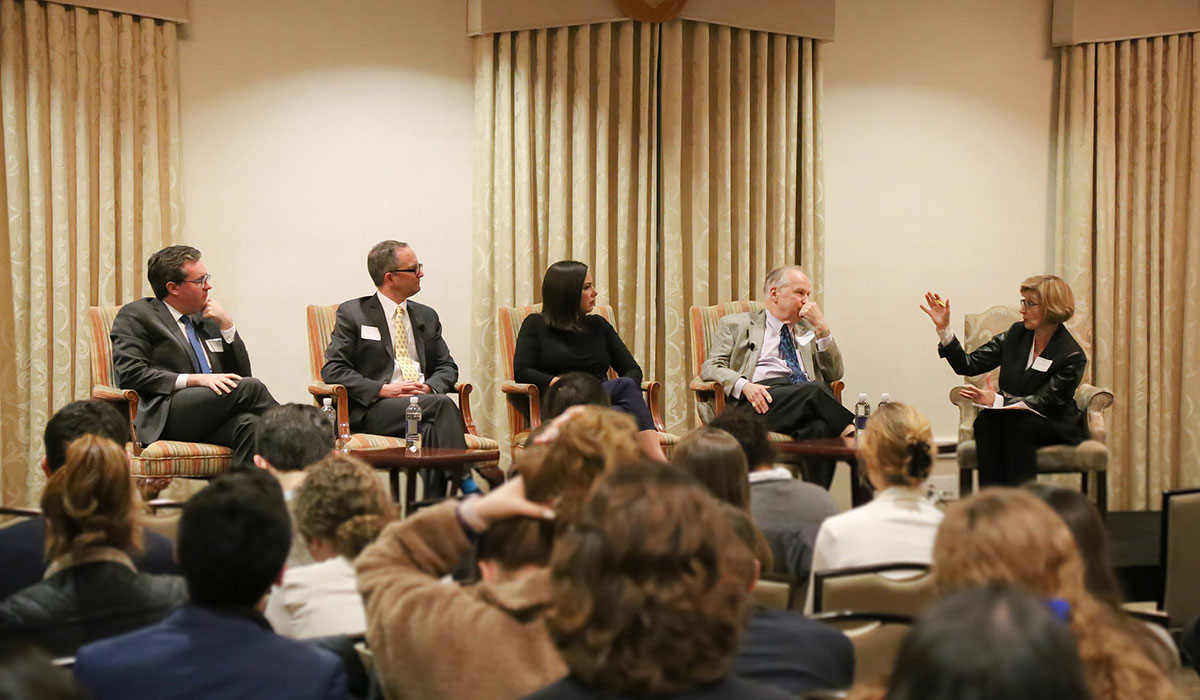

A Republican and a Democrat sat down together in Washington, D.C., and listened to each other’s point of view, disagreed respectfully, and even complimented each other. Yup, it really happened.
The “political climate today” was the main topic at a panel discussion sponsored by Catholic University’s Office of Alumni Relations in January at the University Club. Alumna Sheilah Kast, B.A. 1971, moderated the panel. She is the host of On the Record on WYPR’s public radio in Baltimore.
Two University politics professors served on the panel — John Kenneth White and Matthew Green. Rounding out the panel were two of their former students, Alexandra Wilkes, B.A. 2011, senior vice president of America Rising PAC, and John McCarthy, B.A. 2013, chief of staff for Pennsylvania Democratic Congressman Brendan Boyle.
Kast opened the panel discussion with a pointed question, “How did we get here?”
“We had two very unique candidates in 2016,” said White. “And I would argue two very flawed candidates. In terms of deeply polarized politics, we’ve been here before.” White, who has been a politics professor at the University since 1988, recalled the presidency of John Adams and the Federalist Party as a parallel. “When you look at the landscape of electoral politics today, I think you have a deeply insecure Republican Party that is afraid of losing power. They are afraid they will lose the next presidential election and they are concerned about voting rights and the demographic makeup of the American electorate,” said White, whose latest book What Happened to the Republican Party? Describes how the Republican Party has been transformed from the Reagan years into the party of Donald Trump.
“I think the questions we are dealing with right now are fundamental core questions,” answered McCarthy, a Democratic strategist who was national coalition director for Hillary Clinton’s presidential campaign, co-chair of the Democratic National Committee Ethnic Coordinating Council, and vice president of the Irish Democrats PAC. “What does it mean to be an American? What does it mean to live in America? What are our common values? That’s where the tension exists. Are we part of global society or are we part of an isolationist mentality?”
“I do agree that the tectonic plates of American politics are absolutely shifting and have been for some time, but I’m not so sure it is necessarily party driven,” said Wilkes, an attorney and former chairwoman of the College Republican National Committee (the first female elected to the position in the organization’s 125-year history), and the recipient of the Republican National Committee’s Jeane Kirkpatrick Award. “Think about a time and place where you got your news from five anchors. Now the news is Twitter, it’s everywhere. The same is true of our national political parties. No longer is the party the end all and be all of what it means to be of that persuasion. The primaries of 2016 showcased that.”
“Alex is absolutely right. We are seeing parties getting weaker not stronger. So the question is, what fills the vacuum?” asked Green, who has taught at the University since 2005. He recently taught a new course, “Politics in the Age of Trump.” His latest book Living in the Age of Mistrust was published in 2017. “What we have is an outsider president with no real ties to the Washington establishment. One reason that we are ‘here’ is that there is this power vacuum in Washington.”
Panel members discussed the polarization of American politics, with particular emphasis on the recent government shutdown. The panel discussion was followed by about 45 minutes of questions from the audience, made up largely of students and alumni. Some wanted predictions for the 2020 presidential election.
“Come two years from now, voters will be more inclined to go with a governing majority that actually gets things done,” said White. “Not the check-and-balance they went for in 2018. In 2020 they will be looking for something quite different.
“There are divisions within both parties. Nothing is inevitable in politics,” he added. “There are trends that may favor the Democratic Party. I underscore the word may because nothing is absolutely inevitable. 2016 is evidence of that. Trump is the great unifier in the Democratic Party. When it comes to looking at the next presidential election, they are going to be looking at who can defeat Trump. That will be first and foremost.”
“Is the answer for someone to step up in 2020 and say ‘I am going to govern from the center?’ Or is it someone who is going to be a firebrand?” said McCarthy. “If the election were held today, I believe we would still be being pulled by extremes. My fear looking at the Democratic Party is, have we learned the lessons of 2016? The path forward is not to win by beating Trump, but by putting together a meaningful, cohesive plan for the future.”
One audience member asked McCarthy and Wilkes to articulate their respective party brands.
“There are many places in which I do not agree with the president, but I think some of the deregulation of the Trump Administration has been good for the economy. As a conservative, I do not like the role of government in my life. My vision for the Republican Party is one that empowers the individual, not government,” said Wilkes.
“The Republican idea of manifest destiny empowers the individual — pull yourself up by your bootstraps. But the reality is not everyone can do that,” said McCarthy. “We have fundamentally different views on the role of government,” he said to Wilkes. The two young alumni offered that they appreciated the other’s point of view. “The debate would be enhanced across the board if people would open up and talk about their philosophical differences,” said McCarthy.
“If we had a Congress with equal numbers of people like Alex and John, we would get a lot more done,” said Green.